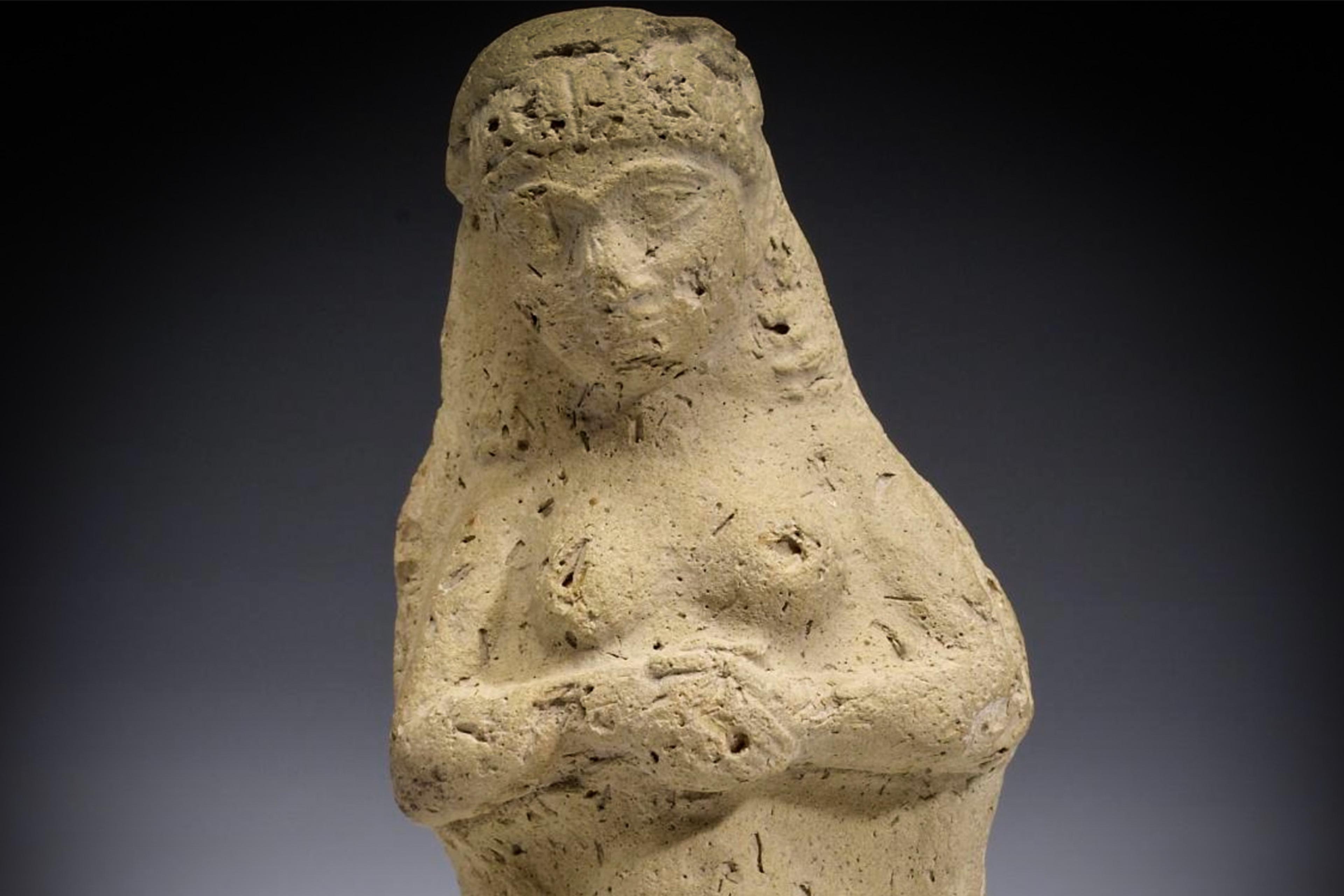When you encounter the word euphoria what do you think of? Perhaps an emotional state, suffused with close synonyms such as bliss and ecstasy? The word originated in ancient Greece and, in its original form as euphoria (εὐφορία), it combined eû (good) and phérein (a verb meaning ‘to bear’ or ‘to carry’). So far as we can tell based on surviving texts, euphoria had a different meaning back then – it implied more a sense of ‘good bearing’, and people usually used it to refer to physical health. What happened? How did the concept of euphoria travel so far? By exploring these questions in relation to three interrelated wellbeing words of Greek origin – enthusiasm, euphoria and ecstasy – I hope to show you the fascinating insights this process of semantic change can reveal, not only about the evolution of language, but about our understanding of human experience.
Enthusiasm
Enthusiasm began life in energised, even exalted territory. In its original Greek, enthousiasmós (ἐνθουσῐᾰσμός) implied that a person was ‘in god’ (en theos). It thus conveyed the sense of being inspired or even possessed by a god, potentially in rapt, uncontrollable ecstasy. This is in stark contrast to its present meaning in English, which usually alludes to a far milder and weaker state.
Various linguistic principles can help to make sense of this dramatic transformation. Linguistic cartography refers to the fact that one of the essential functions of language is to map our world, allowing us to understand and navigate it. Just like geographical maps, languages draw boundaries around regions of the world, and give the resulting circumscribed region a label, thereby creating concepts. This prompts the question of what exactly we mean by ‘the world’.
The British philosopher Karl Popper helpfully identified three distinct, interrelated worlds. The first two are widely recognised: ‘world 1’ is the outer world of material phenomena, whereas ‘world 2’ is our inner subjective world of qualia (ie, thoughts, feelings, etc). In his Tanner Lecture on Human Values in 1978, to these Popper added a third conceptual world, made up of:
products of the human mind, such as languages; tales and stories and religious myths; scientific conjectures or theories, and mathematical constructions; songs and symphonies; paintings and sculptures.
One way to conceptualise each of these three worlds is as an ‘n-dimensional state-space’: that is, a realm of almost infinite possibilities, configured according to any number (n) of dimensions, which combine to create every possible state of the world. Consider the subjective experience of a particular emotion, which would be a world 2 phenomenon. This could be defined along many dimensions – its positivity or negativity (psychologists call this ‘valence’), intensity, arousal, duration, meaning, significance and so on; and its specific location along these would describe the state world 2 is in. Or take a world 1 phenomenon, such as the room you’re in. This could be defined along dimensions such as height, width, depth, temperature, colour, light, space. ‘World 3’ is harder to picture, but likewise avails itself to these dynamics.
Although language is a world 3 phenomenon, it is influenced by all three worlds – for instance, metaphors are shaped by our embodied experience in world 1 and world 2. What’s more, it can map all three. Cultures identify specific regions in n-dimensional state-space, draw a rough, fuzzy boundary around them, and label them with words. In terms of emotional states, for instance, we have become accustomed to demarcating a particular configuration of valence, intensity, duration, etc, as ‘joy’, and a related configuration as ‘contentment’.
With all that in mind, it’s possible to better understand the journey taken by enthusiasm. Originally, it signified a world 2 region of subjective space towards the extremes of most dimensions – intensity, valence, significance, etc – implying being swept away by divine powers. Indeed, when it entered English in the 17th century, it soon acquired, from the Puritans, a derogatory notion of ‘excessive religious emotion through the conceit of special revelation from God’. However, over time, the boundaries of the term drifted, becoming far milder and weaker, and detached from connections to God or the sacred. It is as if enthusiasm’s boundary lines gradually floated downwards until they delineated a quite different region, one much less intense or highly charged.
Euphoria
While enthusiasm drifted downwards, euphoria seems to have moved in the other direction, coming to denote regions of experiential space that are more intense and elevated. I already mentioned how, in ancient Greece, it usually referred to physical health, though it could also be deployed in a moral or developmental sense. For instance, Aristotle sometimes used it as a near synonym of eudaimonia, presenting it as the outcome of a virtuous life. However, whereas enthusiasm filtered down towards milder and weaker territory, euphoria rose upwards. Two further linguistic principles help make sense of this change: ‘concept migration’ and ‘semantic drift’.
The concepts we use to describe our worlds are not inert objects, but living entities, with a dynamic and sometimes dramatic life course – what I call ‘concept migration’, influenced by the notion of ‘concept creep’ developed by the Australian psychologist Nick Haslam. Just as ‘mission creep’ describes the incremental expansion of a project beyond its original scope, Haslam suggested that words such as ‘harm’ have found their remit expanding, both vertically (applying to milder versions of the phenomenon in question) and horizontally (encompassing an ever-broader range of phenomena). My idea of concept migration is similar, except rather than concepts expanding per se, they may instead just move in various ways.
One way concepts migrate is through semantic drift. To appreciate this phenomenon, it helps to return to the cartographic metaphor and the idea that words signify phenomena by drawing boundaries around particular regions of space in any of Popper’s three worlds. Crucially, the way boundaries are imposed is often not ‘natural’ or pre-given, but a matter of social convention. This is the central insight of the various schools of social constructionism. Furthermore, these boundaries can drift over time, sometimes due to conscious pressure and advocacy (think of recent debates around the meanings of terms relating to gender), and other times just randomly.
This kind of drift appears to have happened with enthusiasm and euphoria, except in contrasting directions. In the case of euphoria, the drift was also especially slow. When the word entered English around the 17th century, it was still mainly used in a medical context – as it had tended to be in classical Greek – referring to the condition of feeling well and comfortable, particularly in the context of patients made to feel better through medical intervention. It may be this association with medically induced positive mental states that gave rise to modern uses of the term, which convey an intense feeling of wellbeing, often precipitated by an unusual or even extraordinary cause, such as psychoactive substances. Indeed, the term’s boundaries now cover some of the most highly charged experiential states possible.
Ecstasy
As well as occurring at different rates, semantic drift can also vary in the distance covered. In contrast to euphoria, ecstasy has not migrated that far. However, the experiential territory it covers has arguably shrunk. As ekstasis (ἔκστασις), it combined ek (outside or beyond) and stasis (stature or standing), thereby connoting a person standing outside themselves in some fashion – spanning anything from being astonished or entranced to insane or spiritually possessed. However, in becoming embraced by English, although the word has retained some of these connotations, its scope has gradually narrowed, its territory becoming more constrained. Initially, it was mainly for an exalted state of rapture or mystical union arising from contemplation of the divine, but then over time there was an even further winnowing, as it came to denote intense experiences of pleasure, uncoupled from spiritual concerns. Even now, its journey is ongoing, and who knows the path forward it will take from here.
Ecstasy, like enthusiasm and euphoria, also exemplifies a second form of concept migration known as ‘borrowing’, which involves movement from one language to another, in these cases from Greek to English. Indeed, English is replete with words of Greek origin, as well as many others hailing from elsewhere. In fact, around 40 per cent of the English lexicon is thought to comprise such ‘loanwords’.
While the notion of borrowing is well established, I prefer the metaphor of migration, as it gives more agency and dynamism to words themselves. But why does it occur? Perhaps the most common reason is because a language lacks a word for a given phenomenon, and so has a semantic gap. It therefore borrows a word from a language that does possess one – a word deemed ‘untranslatable’ because it lacks a native exact equivalent. Such words signify phenomena that our own culture has overlooked but which another has identified.
Such borrowing can happen in different ways. Some concepts migrate ‘voluntarily’, appearing as if gifts; English now has a wealth of loanwords relating to meditation and Buddhism, for instance, in large part due to masters from Asia coming to the West in the 19th and 20th centuries, generously bringing their teachings. By contrast, other concepts may have been taken from languages against their community’s wishes, or without due credit, which is often described as ‘cultural appropriation’. Other concepts may be imposed upon a people in forms of linguistic imperialism; for example, the many French loanwords in English are partly due to the Norman conquest of the 11th century. Finally, some borrowing is more organic and pragmatic; cultures may share an experience in common, but only one has named it, then upon learning of this term the second one embraces it.
The Greek words enthusiasm, euphoria and ecstasy fall into that last category, finding their way into English during the Renaissance. Ecstasy led the way in the 14th century, followed later by euphoria and enthusiasm in the 17th century. This era had many qualities, but key among them was a refined sense of what it meant and felt like to be human, including renewed access to the great wealth of insights developed in the classical world – which, of course, were expressed in Greek and Latin. In that context, the existing emotional English lexicon was found wanting and the newly accessible texts offered a veritable bounty of potential concepts.
Indeed, while loanwords constitute a large proportion of English, this is particularly the case for psychological phenomena. When I conducted an etymological analysis of wellbeing-related words in academic discourse, I found that more than 60 per cent were borrowed, mainly from Latin and Greek.
The journeys of words, concepts and humanity
There is a tendency in psychology and related fields to treat our concepts as relatively fixed and universal. It may well be the case that, in broad brush strokes, many psychological experiences – feelings of love or joy, for instance – are indeed shared across different cultures and eras. But charting the journeys of emotional words reveals how the precise lexicon we have for representing these states is dynamic and contingent – varying not only among different languages, but even within the same language over time.
Moreover, the nuances of our language influence, at least to some extent, how we experience and understand the world (known as the linguistic relativity hypothesis). The precise label we affix to elements of our emotional flux – whether we name a feeling as euphoria or ecstasy, for instance, and the subtle meanings these terms hold for us – shapes how we interpret, judge, process, articulate, share and remember such experiences. As such, it behoves psychology, and all of us, to take greater interest in the evolving and fluctuating nuances of our language. After all, when concepts migrate, it is not only ideas that travel to new horizons, but humanity too.








